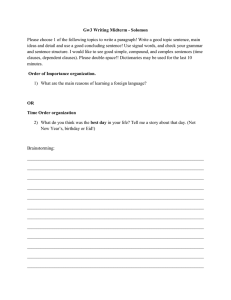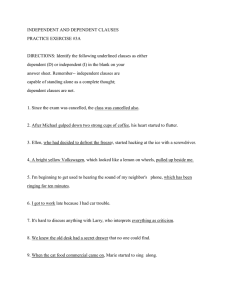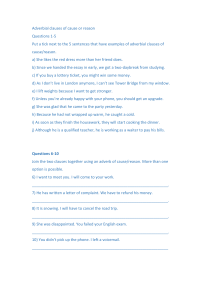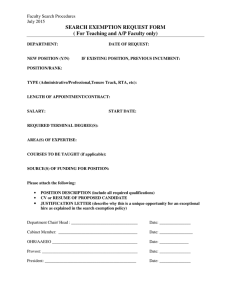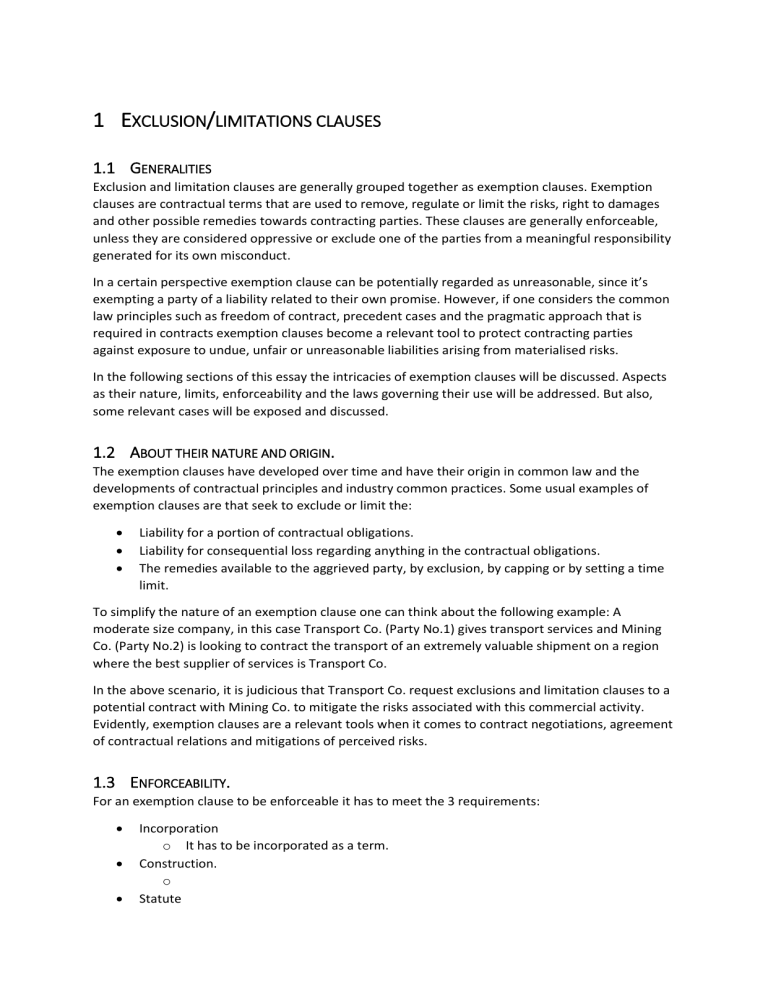
1 EXCLUSION/LIMITATIONS CLAUSES 1.1 GENERALITIES Exclusion and limitation clauses are generally grouped together as exemption clauses. Exemption clauses are contractual terms that are used to remove, regulate or limit the risks, right to damages and other possible remedies towards contracting parties. These clauses are generally enforceable, unless they are considered oppressive or exclude one of the parties from a meaningful responsibility generated for its own misconduct. In a certain perspective exemption clause can be potentially regarded as unreasonable, since it’s exempting a party of a liability related to their own promise. However, if one considers the common law principles such as freedom of contract, precedent cases and the pragmatic approach that is required in contracts exemption clauses become a relevant tool to protect contracting parties against exposure to undue, unfair or unreasonable liabilities arising from materialised risks. In the following sections of this essay the intricacies of exemption clauses will be discussed. Aspects as their nature, limits, enforceability and the laws governing their use will be addressed. But also, some relevant cases will be exposed and discussed. 1.2 ABOUT THEIR NATURE AND ORIGIN. The exemption clauses have developed over time and have their origin in common law and the developments of contractual principles and industry common practices. Some usual examples of exemption clauses are that seek to exclude or limit the: Liability for a portion of contractual obligations. Liability for consequential loss regarding anything in the contractual obligations. The remedies available to the aggrieved party, by exclusion, by capping or by setting a time limit. To simplify the nature of an exemption clause one can think about the following example: A moderate size company, in this case Transport Co. (Party No.1) gives transport services and Mining Co. (Party No.2) is looking to contract the transport of an extremely valuable shipment on a region where the best supplier of services is Transport Co. In the above scenario, it is judicious that Transport Co. request exclusions and limitation clauses to a potential contract with Mining Co. to mitigate the risks associated with this commercial activity. Evidently, exemption clauses are a relevant tools when it comes to contract negotiations, agreement of contractual relations and mitigations of perceived risks. 1.3 ENFORCEABILITY. For an exemption clause to be enforceable it has to meet the 3 requirements: Incorporation o It has to be incorporated as a term. Construction. o Statute https://www.youtube.com/watch?v=1pv19c9bGIo https://youtu.be/1pv19c9bGIo?si=fvzuAnlclnqYIFOI Incorporation of Exemption clauses https://www.youtube.com/watch?v=mQhg4CjHS08 https://youtu.be/1pv19c9bGIo?si=fvzuAnlclnqYIFOI From 94 B08 1.3.1 Exclusion vs Limitation clauses 138 B07 They are both sometimes referred as exemption clauses 139 B07 1.3.2 Validity of an exemption clause 139 B07 97 B08 1.4 LIMITS AND PITFALLS 13.4 of B00 10.2 of B04 24.05 of B05 1.5 FURTHER DISCUSSION. adsf 2 LAWS CONTROLLING EXCLUSION AND LIMITATION CLAUSES 2.1 COMMON LAW CONTROLS Some common law principles that provide consumer protection in Ireland include: Implied Terms: The Sale of Goods and Supply of Services Act 1980 (as amended) implies certain terms into contracts for the sale of goods and the supply of services. These include the requirement that goods be of merchantable quality, fit for their intended purpose, and correspond with any description given. Negligence: Consumers have a common law right to sue for damages if they suffer harm due to a manufacturer's negligence in producing a faulty product. Misrepresentation: If a seller makes a false statement of fact which induces a consumer to enter into a contract, and the consumer relies on that statement to their detriment, they may have a claim for misrepresentation. Nuisance and Trespass: These are common law torts that may apply in situations where a consumer's use and enjoyment of a product or service is disrupted or harmed due to the actions of a business. Breach of Contract: Consumers have the right to seek damages or specific performance if a business fails to fulfill its contractual obligations, provided that the terms of the contract were not unreasonable or unfair. 2.2 STATUTORY CONTROLS Consumer Protection Act 2007: This act established the Competition and Consumer Protection Commission (CCPC) and provides various measures for consumer protection, including provisions on misleading advertising, unfair commercial practices, and consumer information. European Communities (Unfair Terms in Consumer Contracts) Regulations 1995 (as amended): These regulations implement the EU Directive on unfair terms in consumer contracts into Irish law. They aim to protect consumers from unfair contract terms in consumer contracts. Sale of Goods and Supply of Services Act 1980 (as amended): This act sets out consumer rights and implied terms for the sale of goods and the supply of services. Consumer Credit Act 1995 (as amended): This act regulates consumer credit agreements and provides protections for consumers who enter into credit arrangements. 2.2.1 B2B: UCTA 1977 / Contractual Obligations (Applicable Law) Act, 1991 Only B2B contracts. https://www.youtube.com/watch?v=mQhg4CjHS08 https://youtu.be/1pv19c9bGIo?si=fvzuAnlclnqYIFOI 2.2.2 B2C: CRA 2015 / Sale of Goods and Supply of Services Act 1980 / Consumer Protection Act, 2007 / ELECTRONIC COMMERCE ACT, 2000 / Unfair Terms in Consumer Contract Regulations 1999 B2C contracts. https://www.youtube.com/watch?v=mQhg4CjHS08 https://youtu.be/1pv19c9bGIo?si=fvzuAnlclnqYIFOI 3 FURTHER DISCUSSION AND CASE STUDIES 3.1 CASE N1 192 B06 3.1.1 Further Discussion 3.2 CASE N2 24.05 A of B05 3.2.1 Further Discussion 3.3 CASE N3 Asdf 3.3.1 Further Discussion 4 SUMMARY AND CONCLUSIONS Balancing Autonomy and Fairness: One possible conclusion is to emphasize the delicate balance between party autonomy in contract formation and the need for fairness. You can discuss how courts should strike a balance between upholding the parties' freedom to contract and protecting individuals from oppressive or unfair terms. Suggest that courts play a crucial role in ensuring that exemption clauses are clear, unambiguous, and fair to both parties. Importance of Clarity and Transparency: You can conclude by stressing the importance of clear and transparent contract language. Emphasize that exemption clauses should be written in plain and understandable terms, so both parties fully understand the scope of the clauses. This promotes fair dealing and reduces disputes. The Role of Legislation: Discuss the role of legislation and regulatory frameworks in governing exemption clauses. Point out that statutory controls, such as the Unfair Contract Terms Act in the UK or consumer protection laws in various jurisdictions, have been put in place to protect individuals and consumers. Emphasize that these laws are designed to prevent the abuse of exemption clauses and to provide safeguards for those who may be at a disadvantage. Practical Considerations for Businesses: Conclude by addressing the practical considerations for businesses. Explain that while businesses have the right to limit their liability through exemption clauses, they must be cautious not to overreach. Encourage businesses to carefully draft contracts and avoid unfair or one-sided terms to maintain good customer relations. Consideration of Specific Case Law: Depending on the focus of your essay, you might want to conclude with an analysis of specific case law and its implications. Discuss how certain legal cases have influenced the interpretation and enforceability of exemption clauses. Recommendations for Future Practices: Offer recommendations for how parties can improve their use of exemption clauses. This might include suggestions for clearer contract drafting, more transparent negotiations, and adherence to applicable laws and regulations. A Call for Legal Reform: If you argue that exemption clauses are excessively used or abused in certain contexts, you might conclude by calling for legal reform or proposing changes to existing laws or regulations to better protect the interests of consumers or parties with weaker bargaining power. Ultimately, your conclusion should tie together the main points of your essay and provide a resolution or perspective on the issues you've discussed. It should leave the reader with a clear understanding of the complexities surrounding exemption clauses and their legal and ethical implications. More on conclusions: LawTeacher.net. November 2018. Exclusion Clauses Lecture. [online]. Available from: https://www.lawteacher.net/lectures/contract-law/construction/exclusion-causes/?vref=1 [Accessed 5 November 2023]. B00 B05 B06 B07 B08 B11 B12 B13
